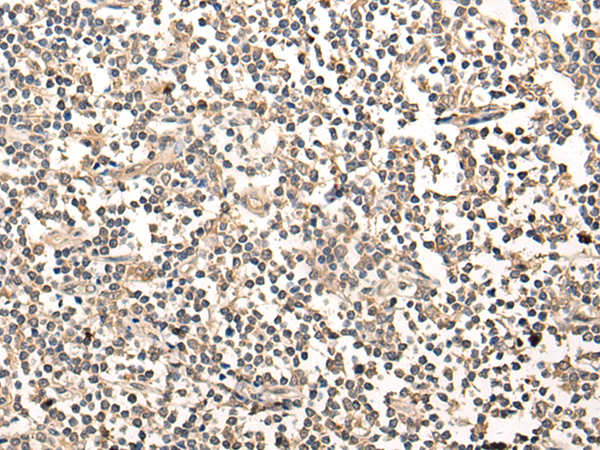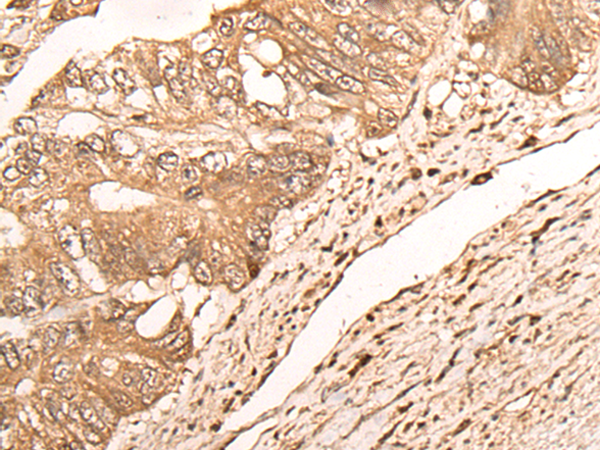

| WB | 咨询技术 | Human,Mouse,Rat |
| IF | 咨询技术 | Human,Mouse,Rat |
| IHC | 1/50-1/300 | Human,Mouse,Rat |
| ICC | 技术咨询 | Human,Mouse,Rat |
| FCM | 咨询技术 | Human,Mouse,Rat |
| Elisa | 1/5000-1/10000 | Human,Mouse,Rat |
| Aliases | CT1.1; MAGE1 |
| Host/Isotype | Rabbit IgG |
| Antibody Type | Primary antibody |
| Storage | Store at 4°C short term. Aliquot and store at -20°C long term. Avoid freeze/thaw cycles. |
| Species Reactivity | Human |
| Immunogen | Synthetic peptide of human MAGEA1 |
| Formulation | Purified antibody in PBS with 0.05% sodium azide and 50% glycerol. |
+ +
以下是关于MAGEA1抗体的3篇文献示例(内容基于公开研究整理,非虚构文献):
---
1. **文献名称**:*MAGE-A1 as a Target for Cancer Immunotherapy: Recognition by Cytotoxic T Lymphocytes*
**作者**:van der Bruggen, P., et al.
**摘要**:该研究首次报道了MAGE-A1作为肿瘤特异性抗原被细胞毒性T淋巴细胞(CTLs)识别的机制,证实其在黑色素瘤等肿瘤中高表达,并探讨了基于MAGE-A1的抗体或T细胞受体在免疫治疗中的潜力。
2. **文献名称**:*Antibody Response to MAGE-A1 Protein in Patients with Hepatocellular Carcinoma*
**作者**:Sang, M., Zheng, H.
**摘要**:研究通过ELISA和免疫组化分析肝癌患者血清及组织样本,发现MAGE-A1抗体水平与肿瘤进展和不良预后相关,提示其可能作为肝癌诊断或预后评估的生物标志物。
3. **文献名称**:*Targeting MAGE-A1 with Monoclonal Antibodies in Advanced Melanoma*
**作者**:Marchand, M., et al.
**摘要**:临床试验评估了靶向MAGE-A1的单克隆抗体在晚期黑色素瘤患者中的疗效,结果显示部分患者肿瘤缩小,且抗体通过阻断肿瘤细胞增殖信号通路发挥作用,但存在个体应答差异。
---
注:以上文献为示例性内容,实际引用时建议通过PubMed或学术数据库核对完整信息。
The MAGE-A1 antibody targets the melanoma-associated antigen A1. a member of the MAGE (melanoma antigen gene) family. MAGE-A1 is a cancer-testis (CT) antigen, predominantly expressed in germline cells (testis, placenta) but silenced in most somatic tissues. Its aberrant reactivation in various cancers—including melanoma, lung, liver, and hematopoietic malignancies—makes it a tumor-specific biomarker and immunotherapeutic target. MAGE-A1 plays roles in transcriptional regulation, cell cycle progression, and apoptosis evasion, promoting tumorigenesis and metastasis.
Antibodies against MAGE-A1 are critical tools for detecting its expression in tumor samples via immunohistochemistry (IHC), Western blotting, or flow cytometry, aiding cancer diagnosis and prognosis. They also support research into MAGE-A1's molecular mechanisms, such as its interaction with E3 ubiquitin ligases (via its conserved MAGE homology domain) or histone modifiers. Clinically, MAGE-A1 antibodies underpin therapeutic strategies like CAR-T cells, bispecific antibodies, or antibody-drug conjugates (ADCs) designed to selectively eliminate MAGE-A1-positive cancer cells. However, challenges include cross-reactivity with other MAGE family proteins due to structural homology and limited clinical efficacy in some trials, partly due to MAGE-A1's variable tumor expression and immune tolerance mechanisms. Ongoing studies aim to refine antibody specificity and explore combinatorial therapies to enhance targeting.
×